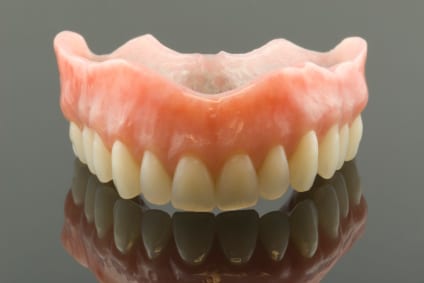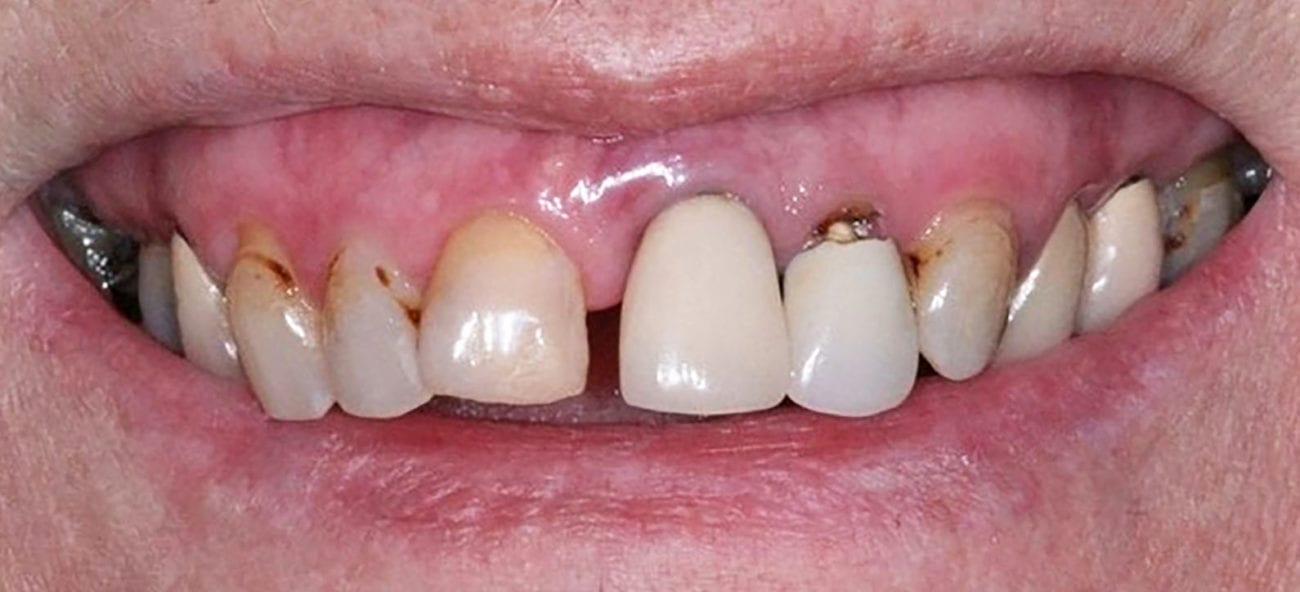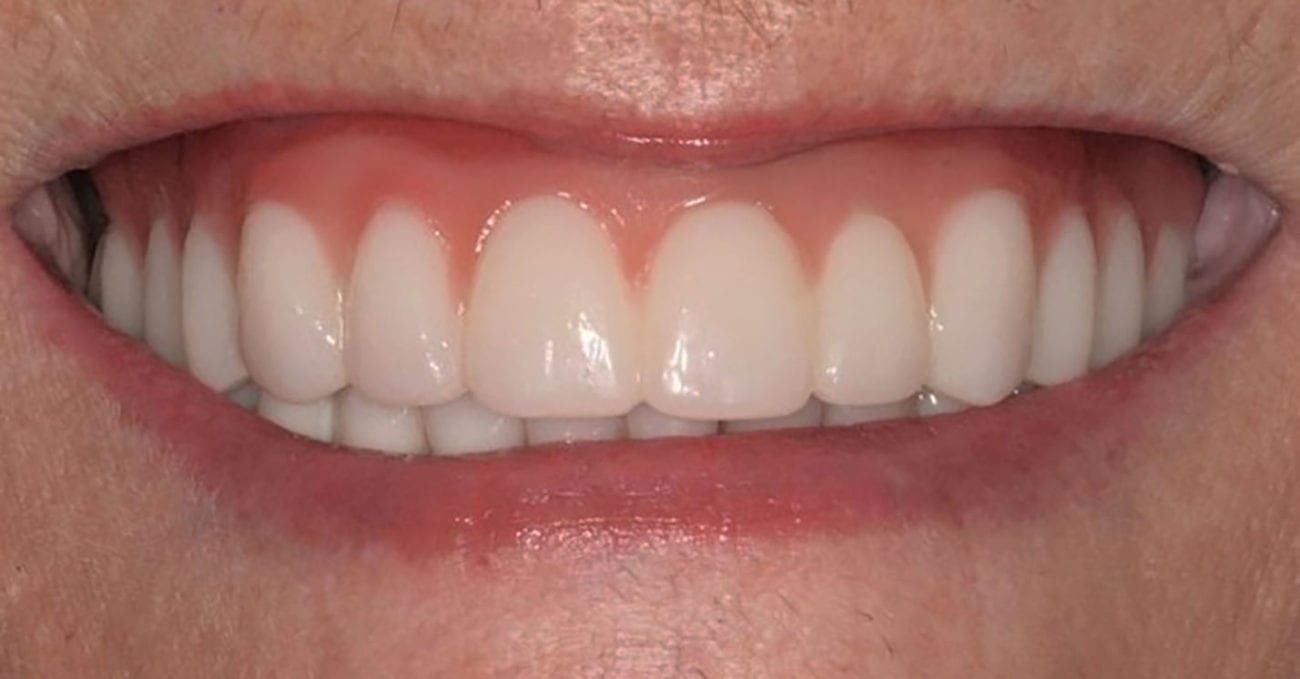Are you frustrated about your ill-fitting dentures? Are you missing a full row of teeth?
Missing teeth can affect your health and how you look. Dentures and partials are a common way to improve your smile and health.
Teeth do more than just help you chew. They also support your lips and cheeks. Without them, your face can start to sag, making you look older. It can also cause other health issues, like infections, diseases, overall health issues, and oral cancer.
At our practice, Dr. Robert Cain has years of experience replacing teeth. He offers different types of dentures, including ones that attach to implants for a stronger fit.
Our team of specialists works together to give you the best result. We want your new smile to feel good, fit perfectly, and help you stay healthy.
Implant-Supported Overdenture
An implant-supported overdenture is an alternative to traditional removable dentures. Though the implant-supported prosthesis is a greater financial investment, the long term benefits outweigh initial costs. These types of dentures use two to four strategically placed dental implants to attach to your mouth.
Implant-supported dentures offer a range of health and lifestyle benefits when compared to traditional removable dentures, including:
- Stable and Secure Restoration: The implants will be used to permanently secure your new teeth to the gums.
- Restores Normal Chewing: Implant dentures will allow you to chew foods without worry, because they stay firmly in place. Patients can enjoy a more nutritious and varied diet.
- Confident Speech: Your new secure smile will allow you to speak normally and confidently.
- Reduced Bone Loss: One of the health benefits when using dental implants to replace missing teeth is the stabilization of bone loss. Bone naturally deteriorates in the jaw after tooth loss. However, the implant effectively replaces the missing tooth root and stimulates healthy bone cell growth.
Dr. Cain is a leading periodontist and prosthodontist in Knoxville, TN. He works with patients to create a new smile that will give them back their best quality of life. Working with our in-house periodontist, we can provide you the convenience of complete services under one roof.
Replacing missing teeth will support your dental health and your physical well-being. A healthy and stable smile is a key component of long-term wellness.

Traditional Dentures: What Are Your Options?
If you’re missing all your upper or lower teeth, a full set of dentures can give you back your complete smile. These are removable appliances that you take out at night for cleaning. The best part is that today’s dentures are nothing like the old-fashioned kind. They’re made with modern materials that look and feel much more like natural teeth.
Most people won’t be able to tell you’re wearing them at all. You’ll be able to eat your favorite foods, speak clearly, and laugh with confidence without worrying about them slipping or falling out.
If you’re only missing a few teeth, a partial denture might be the right solution. Partials are perfect for filling in a few gaps here and there in your smile. Replacement teeth attach to a base that is colored to look like your natural gums.
To keep it secure, a partial denture has small metal clasps on each side. These clasps gently hook onto your healthy natural teeth, acting like anchors to hold the partial firmly in place. This means it stays put while you talk and eat, but you can still remove it easily for cleaning.
Whether you need a full or partial denture, our goal is the same. We help you restore your smile so you can feel good about it every day.
Denture Case Study
Before Dentures:

Prior to restoration, the patient above had gum disease. Bleeding gums were causing her pain and worsening tooth decay. We were able to provide her with dentures in our Knoxville dental office.
After Dentures:

Here is her finished smile with a fixed prosthesis after getting full dentures. Her gums were treated with periodontal therapy and thoroughly cleaned.
Contact us to learn more about options for replacing missing teeth. We will conduct a comprehensive dental exam to determine if you are the right candidate for dentures. Give us a call at (865) 276-7173 today, or schedule an appointment online.
Dentures FAQs
How do I know if I need new dentures?
Your mouth changes shape as you get older, but your dentures stay the same. You should get new dentures if:
- They don’t fit well anymore.
- They are uncomfortable or cause pain.
- They are more than 7 years old (as recommended by the American Dental Association).
Can I get dentures on the same day my teeth are pulled?
Yes. We can give you temporary dentures, called “immediate dentures”, to wear that same day. These let you eat and speak normally while we take the time to carefully make your permanent, custom-fit dentures. Once they’re ready, you’ll come back so we can fit you with your final set.
Do I have to keep my dentures in water?
Whenever you’re not wearing your dentures, you must keep them in water or a denture-soaking solution. If they dry out, they can warp, lose their shape, and become damaged.
Will dentures change how my face looks?
Yes, dentures can change your face, and it’s usually a good change. Implant-supported dentures are especially good at supporting your cheeks and lips, which keeps your face from sagging. They also help maintain the bone in your jaw, which is important for your facial structure.
How long does it take to get used to new dentures?
It usually takes a few days to get comfortable with your new dentures. At first, they might feel loose or strange in your mouth. You may also produce more saliva or have minor sore spots. Be patient and follow your dentist’s advice for a smoother adjustment.
Will I be able to eat normally with dentures?
Yes, but you will need to start slowly. Begin with soft foods cut into small pieces. As you adjust to the dentures, you can carefully try tougher foods. Avoid very hard, sticky, or extremely hot foods that could damage them.
How do I clean my dentures every day?
You should brush your dentures daily with a soft brush and a special denture cleaner. Don’t use regular toothpaste, because it’s too abrasive and can scratch them. Always rinse them thoroughly after cleaning. It’s also important to clean your mouth by brushing your gums and tongue.
Should I wear my dentures to bed?
No, it’s not a good idea to sleep with your dentures in. Take them out so your gums and jawbone have a chance to rest. This also helps prevent infections and lets you clean the dentures properly. Always store them in water or a soaking solution overnight.
What’s the difference between regular and implant dentures?
Regular dentures rest on your gums and are held in place with adhesive. Implant dentures snap onto metal posts that a dentist surgically places in your jawbone. This makes implant dentures much more stable and secure. They also help prevent bone loss in your jaw.
Can dentures affect how I speak?
When you first get dentures, they might slightly change how you talk. You might have a slight lisp or find some words tricky to pronounce. This is completely normal and temporary. With a little practice, like reading aloud, your speech will return to normal.
How often should I see my dentist after getting dentures?
You should still see your dentist for a check-up at least once a year. They will check that your dentures still fit correctly and aren’t damaged. They also need to examine your mouth for any signs of irritation or oral health issues. Regular visits help ensure your dentures last and your mouth stays healthy.
What should I do if my dentures break or feel loose?
If your dentures crack, break, or feel loose, you should call your dentist right away. Don’t try to fix them yourself with glue because it can ruin them and may be toxic. A loose fit often means your mouth has changed and they need to be adjusted. Your dentist can professionally repair or reline them so they fit properly again.
